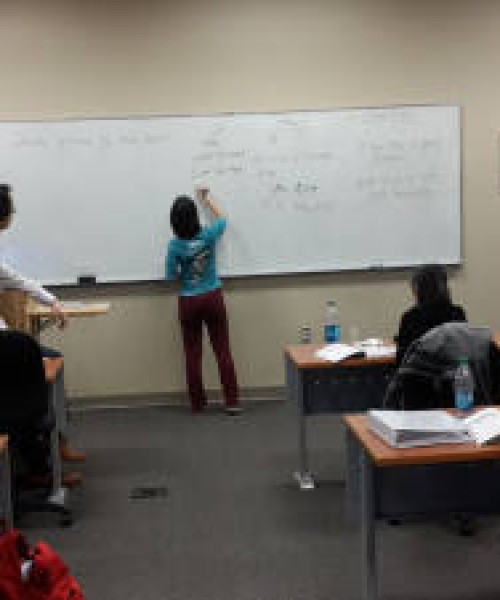The accountant in any organization performs many vital activities. These activities are loosely performed and subsequently determine the duties to be performed. This study aims to determine the common accounting activities being performed in The Bahamas and the extent at which they are being performed as required. The subjects of this study are Bookkeepers and Management Accountants in the smaller private firms at which a questionnaire concerned with the activities of those in 44 public accounting firms will be sent. The survey consisted of 30 questions covering the topics of the role of an accountant and the various duties involved. Research found certain variances had great influences on the duties performed by the Accountant.
Exploratory Study of The Common Accounting Activities in the Bahamas and to What Extent Are They Being Performed By Qualified Independent Accountants?
The term Accountant, unlike Doctors and Lawyers is not a reserved title as just about anyone can call himself or herself an Accountant. What distinguishes the nut from the shell is the individual's level of qualification and perhaps, more so, the duties performed within their respective organization. Qualified public accountants in the Bahamas are required to register with The Bahamas Institute of Chartered Accountants (BICA). Noting such, BICA has a total of 252 persons registered as qualified Public Accountants in the Bahamas, which allows them to carry such title and to engage in public practice.
Accountants can serve many different roles within an organization and are generally required to keep financial records for individuals, small businesses and large corporations. The accountant in any organization plays many vital roles and complete tasks that are necessary for a company to stay on top. These tasks are loosely performed, as there are many fields within the Accounting profession, which subsequently determines the duties to be performed. For this reason, the focus of this study will be on those duties performed by Bookkeepers and Certified Public Accountants (CPA).
Bookkeeping is crucial to any small or and medium business who wish to maintain proper financial records and keep track of the company's financial position. In an effort to assist companies with this time consuming task, accounting firms, particularly medium to small accounting firms, outsource such tasks which may range from billing to invoice generation as well as preparing financial statements. Bookkeepers within the firm tend to focus on these small, sometimes tedious tasks to help reduce the work pressure of their clients and more often their own Certified Public Accountants.
Certified Public Accountant is the formal title for qualified accountants who have passed the Uniform Certified Public Accounting Examination in the United States. Public Accountants in the Bahamas usually provide a broad range of accounting, auditing services to the general public. "Accountants and auditors are broadening the services they offer to include budget analysis, financial and investment planning, information technology consulting, and limited legal services" (United States Bureau of Labor Statistics, 2005). The study aims to identify all of the common accounting activities in The Bahamas, as it is necessary to understand each of the different roles played in the accounting firm.
Statement of the Problem
As many accounting activities exist in The Bahamas, ranging from bookkeeping to audit services, a problem exists where many non-accountants, or better yet unqualified accountants, are performing duties, which should be performed by qualified independent accountants.
WHAT IS NOT KNOWN IS to what extent and for what reasons are those duties being performed and what impact does it have on the company.
SO THAT I can make an assessment as to what is needed to avoid conflicts within the profession.
Purpose Statement
The purpose of this study is to determine the common accounting activities being performed in The Bahamas and the extent at which they are being performed as required.
Significance of the Study
The significance of this study is to enlighten accountants in the industry, as well as the general public, as to the common activities being performed, the conflicts that may exist and the subsequent impact on the profession.
It will illuminate influences of the independent variables, such as the consulting duties, on the dependent variable.
Research Questions
Determine the various accounting activities in The Bahamas
Measure the role/duties of an Accountant
What is the relationship between the Accountant and their assign task in their respective entities
Determine to what extent those conflicts, if any, impact the industry
Review of Literature
Accountants are the backbone of the financial world. They ensure a company's financial security thus helping to drive the company's overall management and strategy. The public accounting profession is quite an important one essentially because it is among the most well known and consists of central responsibilities of the accounting profession; this includes auditing and consulting. According to Boyd, most professional public accountants [work] in public-practice that provide accounting services to businesses. (Boyd, 2004) Management is ultimately responsible for the preparation of the company's financial statements however the public holds the company's accountant/auditor responsible to some extent and looks to them to evaluate and verify those statements as part of the audit function.
Accounting scandals in the United States, like those involving ZZZZ Best and the S&L crisis, subsequently increased the pressure placed on those in the accounting profession requiring Accountant to become more effective and independent and their services. There has yet to been a recording of such scandals in the Bahamas. In response to those scandals in the US, The National Commission on Fraudulent Financial Reporting issued a new code of professional conduct for CPAs, which was designed to assuage to the gap that exists between the public expectation of accountants and the services that are actually being provided. These codes were issued in an effort to signal to the general public that the public accounting profession is genuine in its effort to undertake greater responsibility for the ethical behavior of the accountant.
It is believed that the atmosphere in which the individual carry out their responsibilities influences whether or not they will perform with good judgment. Arnold et al performed a study on the cross-cultural influences on individuals' approaches to and the perceptions of the business related ethical dilemma. (Arnold et al., 2007) The goal of their research was to gather whether cross-cultural differences exist in individuals' sensitivity to ethical dilemmas among the selected Western European countries. At it relates to those influences on the activities of the accountant and subsequently their duties, Doran and O'Mahony conducted a study on the implementation of Enterprise Resource Planning (ERP) systems and the ensuing change on the role of the management accountant.
ERP is a broad term for any software application that integrates all business processes and data into a single system. (Waxer, 2006) It is believed that these systems impacted the way in which accounting information is processed, evaluated and reported. In their research, Doran et al found that it is well documented that there has been a shift in the role of the management accountant. ERP is one of the major contributors to the change in the role of the management accountant. (Doran et al., 2008) Within their study, they came across an interesting discovery in relation to the idea of non-accountants becoming accountant. It is believe that such transition would reduce the amount of conflicts that may exist within the profession. Numerous studies have been conducted that describe the conflicts of interest within the accounting profession however few indicate whether those instances were as of a result of the incompetency of the non-accountant.
Conflicts of interest place, at times, intolerable pressure on the ethical judgments of accountants employed in accounting firms. A common conflict that exists in the profession is that between the auditing and consulting duties. "The emergence of possible conflicts of interest for audit firms related to the simultaneous sale of consulting services to audit clients was widely recognized by critics of the accounting profession, but this core problem remained substantially unrecognized and uncorrected by the profession itself." (Boyd, 2004)
Growing conflicts of interest that exist between auditing and consulting in the common activities of accounting firms would have mirrored in less than subtle ways the accounting institutes themselves. "Most firms obviously manifest by their reluctance to support initiatives designed to eliminate these conflicts of interest." (Boyd, 2004)
Some firms consistently claim that the accountant's independence in performing an audit was unaffected by consulting activity. Some firms argued, "since there was no empirical evidence of conflicts of interest between auditing and consulting, then such conflicts could not be presumed to exist." (Boyd, 2004) Levitt refers to this as the "no smoking gun" argument (Levitt, 2002). A number of research studies had sought to produce empirical evidence of a conflict of interest between audit and consulting work provided for the same client, but these had generally been inconclusive. (Boyd, 2004)
For this and other reasons, some firms opt to outsource those duties to other professional. Conflict to existed as the accountant at times found it difficult to consult with the professional. Belik and Violette conducted a survey of CPAs, attorneys and financial planners that asked the professionals to rate their level of satisfaction with each other regarding their work together. (Belik et al., 2010) In the survey results, it was discovered that CPAs were more satisfied with working with attorneys than with financial planners not discrediting that they were unable to work with financial planners.
Given these variables, the overall code of conduct exercised by the individual determines the extent to which conflicts exist. Arnold et al in their research discovered that that past research document that code of conduct impacted the various activities within the practice of public accounting firms such as on the auditors' interpretation and implementation of making decisions regarding appropriate level of materiality estimates when conducting audit steps and on inappropriate professional actions such as prematurely signing off on individual audit assignment. (Arnold et al., 2007)
Integrity/discreditable acts
The management of an organization normally sets the tone of the integrity involved in the financial reporting process. The integrity involved then integrates the judgment of the Accountant. "The accountant professional judgment means the process that accountants fully consider the actuality and future financing environment and management characteristics of enterprise, utilize the information materials, use their professional methods, logic analysis ability and professional experience, judge and select the principles, methods, and program when disposing daily accounting items and making financial report, and facing uncertain accounting items, according to accounting law, standard and traditions" (Dai, X. 2010) In using judgment within the accounting activity, the accountant is required maintain objective and to have integrity in the course of their work and to avoid conflicts of interest. It is possible though, that the accounting may not knowingly misrepresent facts or subordinate their own judgment for whatever reason. This study aims to identify just that.
Independence and Objectivity
The Bahamas Institute of Chartered Accountants (BICA) maintains a code of professional conduct that requires its members to be independent and objective in the performance of their professional services. There are interpretations to BICA's rules on independence that describe when independence is and is not impaired. During the period of a professional engagement, for instance an audit, independence is considered to be impaired if the accountant or the firm at large had any direct or material indirect financial interest in the company in which the audit is being performed. Noting such, a public accounting who performs audit service for a client may also chose to perform nonaudit services, for instance consulting, for that client however before they are able to perform the additional service, the individual must evaluate the effect of those services on his or her independence. In particular, care should be taken not to perform management functions or make management decisions for the audit client in order to avoid conflicts within the activity.
Theoretical/Conceptual Framework
Independent Variables
Dependent Variables
Accounting Activities
Integrity
Independence
Role Conflict
Public Accountant/Bookkeeper
Methodology
The subjects of this study are Bookkeepers and Management Accountants in the smaller private firms.
Research design
A questionnaire concerned with the activities of those in the public accounting profession will be placed in enclosed envelopes to be sent to the relevant Bookkeeper or Accountant to be subsequently picked up on a specified day at a specified time.
Population
The population of firms fitting this criteria are 44 firms excluding "The Big Four" firms (i.e. KPMG, Ernst and Young, Pricewaterhouse and Deloitte & Touche), as selected from The Bahamas yellow pages, therefore since the entire population fits the criteria for the entire population would be selected and eligible for the survey.
Sample Size
Forty-Four smaller accounting firms are listed at which one (1) Management Accountant and one (1) Bookkeeper would be selected consisting of a sample size of 88 individuals.
Sampling design
Instrument
The survey consists of 30 questions covering the topics of the role of an accountant and the various duties involved. Of the 30 questions, there are 14 questions, specifically varied towards the attributes that influence the
Procedure
Each accountant or bookkeeper will be sent the survey and will be asked to fill out the surveys and place them in a concealed envelope stamped confidential where they will be picked up on Thursday evening.
Given confidentiality is imperative to the study, the envelopes remain concealed until the study is completed. Once the study is completed the results and assessments will be published and respondent's personal information would be discarded.
Data Analysis
The use of qualitative analysis of data and considering rival explanations for findings will be essential for a high quality analysis.
Cross tabulations would also be computed to test relationships between the Bookkeeper/Accountant and their respective duties. In this study the individual (Bookkeeper/Accountant) will act as the dependent variable, while the various duties will act as the dependent variables.
Anticipated Results
Research found variances such as judgment; integrity and role conflict had great influences on the duties performed by the Accountant and the extent at which those duties are performed.
Past research has documented that other variances have also impacted the various activities within the public accounting practice. They include the professional's interpretation and implementation of making decisions.
Timeline for Research Project
The process for completion of the study will take approximately fourteen weeks.
Week
January
February
March
April
1
2
3
4
5
6
7
8
9
10
11
12
13
14
Review of Literature
Â
Â
Â
Â
Â
Â
Â
Â
Â
Â
Â
Â
Â
Survey
Â
Â
Â
Â
Â
Â
Â
Â
Â
Â
Â
Â
Â
Analysis
Â
Â
Â
Â
Â
Â
Â
Â
Â
Â
Â
Â
Â
Report
Â
Â
Â
Â
Â
Â
Â
Â
Â
Â
Â
Â
Â
Presentation
Â
Â
Â
Â
Â
Â
Â
Â
Â
Â
Â
Â
Â
Budget for Research Project
Copies
(3 pgs @ .10 p/pg x 88 persons)
$26.40
Transportation (Drop-Off & Pick-Up)
$200.00
Total Cost
$226.40
References
Arnold, D., Bernadi, R., Neidermeyer, P. & Schmee, J. (2007). The effect of country and culture on perceptions of appropriate ethical actions prescribed by codes of conduct: a western European perspective among accountants. Journal of Business Ethics, 70:327-340
Belik, B. & Violette, G. (2010). Examining satisfaction in multiprofessional engagements. The CPA Journal, 65-67
Boyd, C. W. (2004). The structural origins of conflicts of interest in the accounting profession. Business Ethics Quarterly, 3(14): 377-398
Dai, X. (2010). Study on relative problems about the accountant professional judgment ability. International Journal of Economics and Finance, 2(3): 72-75
Doran, J., & O'Mahony, A. (2008). The changing role of management accountants; evidence from the implementation of ERP systems in large organisations. International Journal of Business and Management, 119-115
Eynon, G., Hill, N. T. & Stevens, K. (1997). Factors that influence the moral reasoning abilities of accountants: implications for universities and the profession. Journal of Business Ethics, 1297-1309
Forte, A. (2004). Business ethics: a study of the moral reasoning of selected business managers and the influence of organizational ethical climate. Journal of Business Ethics, 51: 167-173
Radtke, R. R. (2008). Role morality in the accounting profession - how do we compare to physician and attorneys? Journal of Business Ethics, 79: 279-297
Rogers, R., Dillard, J. & Yuthas, K. (2005). The accounting profession: substantive change and/or image management. Journal of Business Ethics, 58: 159-176










